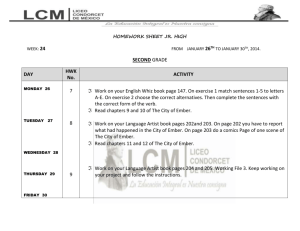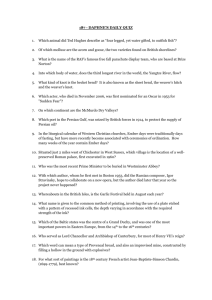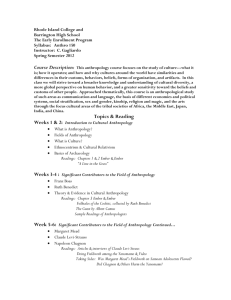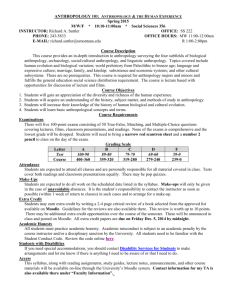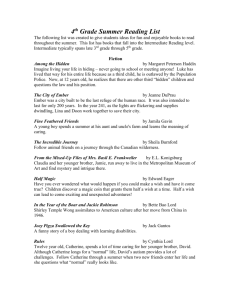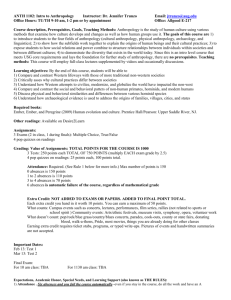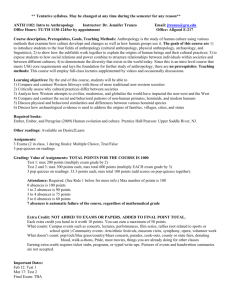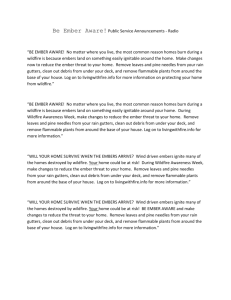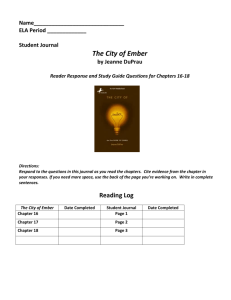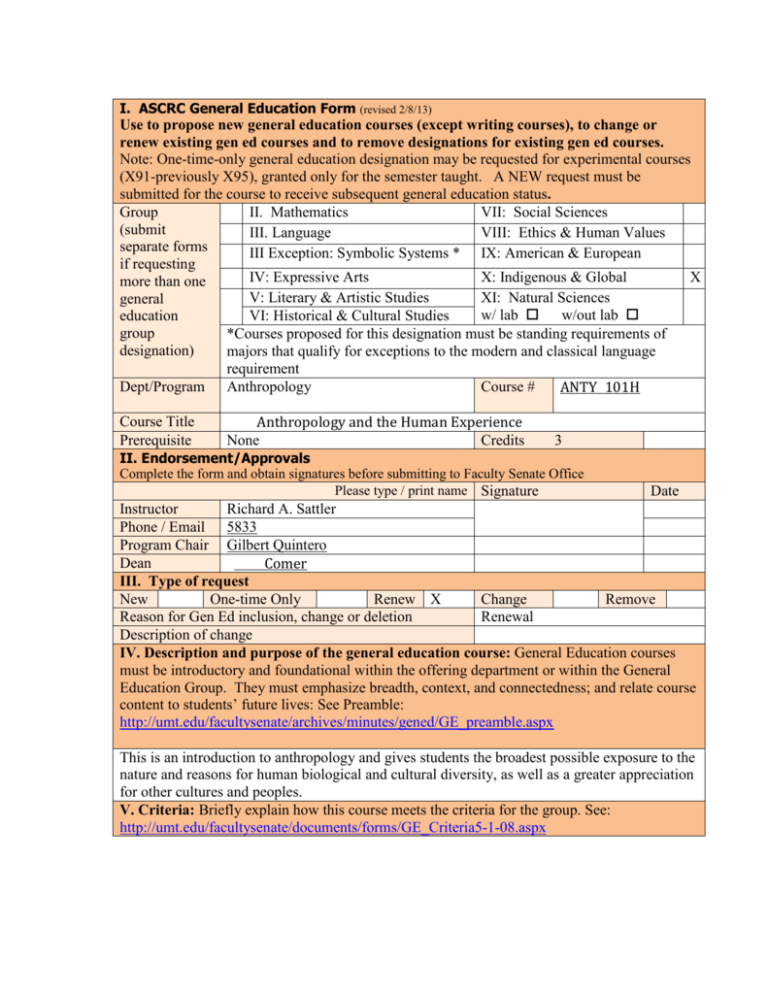
I. ASCRC General Education Form (revised 2/8/13)
Use to propose new general education courses (except writing courses), to change or
renew existing gen ed courses and to remove designations for existing gen ed courses.
Note: One-time-only general education designation may be requested for experimental courses
(X91-previously X95), granted only for the semester taught. A NEW request must be
submitted for the course to receive subsequent general education status.
Group
II. Mathematics
VII: Social Sciences
(submit
III. Language
VIII: Ethics & Human Values
separate forms
III Exception: Symbolic Systems * IX: American & European
if requesting
IV: Expressive Arts
X: Indigenous & Global
X
more than one
V: Literary & Artistic Studies
XI: Natural Sciences
general
w/ lab w/out lab
education
VI: Historical & Cultural Studies
group
*Courses proposed for this designation must be standing requirements of
designation)
majors that qualify for exceptions to the modern and classical language
requirement
Dept/Program Anthropology
Course #
ANTY 101H
Course Title
Prerequisite
Anthropology and the Human Experience
None
Credits
3
II. Endorsement/Approvals
Complete the form and obtain signatures before submitting to Faculty Senate Office
Please type / print name Signature
Date
Instructor
Richard A. Sattler
Phone / Email 5833
Program Chair Gilbert Quintero
Dean
Comer
III. Type of request
New
One-time Only
Renew X
Change
Remove
Reason for Gen Ed inclusion, change or deletion
Renewal
Description of change
IV. Description and purpose of the general education course: General Education courses
must be introductory and foundational within the offering department or within the General
Education Group. They must emphasize breadth, context, and connectedness; and relate course
content to students’ future lives: See Preamble:
http://umt.edu/facultysenate/archives/minutes/gened/GE_preamble.aspx
This is an introduction to anthropology and gives students the broadest possible exposure to the
nature and reasons for human biological and cultural diversity, as well as a greater appreciation
for other cultures and peoples.
V. Criteria: Briefly explain how this course meets the criteria for the group. See:
http://umt.edu/facultysenate/documents/forms/GE_Criteria5-1-08.aspx
Indigenous and/or global courses will
familiarize students with the values,
histories, and institutions of two or more
societies through the uses of comparative
approaches.
This class examines and compares the
lifeways and cultures of human societies
from the earliest proto-human ancestors to
the present, covering the widest array of
cultures possible to show the richness and
diversity of the human experience from a
global perspective.
We examine the cultures of diverse
indigenous peoples, as well as others, from
around the world to gain greater appreciation
for the richness of their lives.
Indigenous perspective courses address the
longstanding tenure of a particular people in
a particular geographical region, their
histories, cultures, and ways of living as well
as their interaction with other groups,
indigenous and non-indigenous.
This class gives students an overview of the
Global perspective courses adopt a broad
focus with respect to time, place, and subject development and varieties of human
experience from the earliest proto-human
matter and one that is transnational and/or
multi-cultural/ethnic in nature. Whether the ancestors to the present, covering the widest
array of cultures possible to show the
cultures or societies under study are
richness and diversity of the human
primarily historical or contemporary,
experience from a global perspective
courses investigate significant linkages or
interactions that range across time and
space.
VI. Student Learning Goals: Briefly explain how this course will meet the applicable learning
goals. See: http://umt.edu/facultysenate/documents/forms/GE_Criteria5-1-08.aspx
1. place human behavior and cultural ideas into
We examine human behavior and
a wider (global/indigenous) framework, and
cultural ideas from a global perspective,
enhance their understanding of the complex
and draw examples from a wide range of
interdependence of nations and societies and
indigenous and other societies.. A major
their physical environments;
focus of the course is the diverse ways
humans structure their social, political,
and cultural lives; and the richness of this
heritage.
2. demonstrate an awareness of the diverse ways The class emphasizes the complex
humans structure their social, political, and
interdependence of nations and societies
cultural lives;
and their physical environments.
3. analyze and compare the rights and
responsibilities of citizenship in the 21st century
including those of their own societies and
cultures.
Students will learn the ways in which
societies define the rights and
prerogatives of their members, as well as
examining the ways our actions impact on
others.
VII. Justification: Normally, general education courses will not carry pre-requisites, will carry
at least 3 credits, and will be numbered at the 100-200 level. If the course has more than one
pre-requisite, carries fewer than three credits, or is upper division (numbered above the 200
level), provide rationale for exception(s).
None
VIII. Syllabus: Paste syllabus below or attach and send digital copy with form. The syllabus
should clearly describe how the above criteria are satisfied. For assistance on syllabus
preparation see: http://teaching.berkeley.edu/bgd/syllabus.html
ANTHROPOLOGY 101.03: ANTHROPOLOGY & THE HUMAN EXPERIENCE
Fall 2013
T/R * 2:10-3:30pm * North Urey Lecture Hall 101
INSTRUCTOR: Richard A. Sattler
222
PHONE: 243-5833
11:00-12:00n
E-MAIL: richard.sattler@ umontana.edu
2:00pm
OFFICE: SS
OFFICE HOURS: T/R
W 1:00or by
appointment
COURSE DESCRIPTION
This course provides an in-depth introduction to anthropology surveying the four subfields
of biological anthropology, archaeology, social/cultural anthropology, and linguistic
anthropology. Topics covered include human evolution and biological variation; world
prehistory from Paleolithic to bronze age; language and expressive culture; marriage, family, and
kinship; subsistence and economic systems; and other cultural subsystems. There are no
prerequisites. This course is required for anthropology majors and minors and fulfills the general
education social science distribution requirement. The course is lecture based with opportunities
for discussion of lecture and films.
COURSE OBJECTIVES
1. Students will gain an appreciation of the diversity and richness of the human experience.
2. Students will acquire an understanding of the history, subject matter, and methods of study in
anthropology.
3. Students will increase their knowledge of the history of human biological and cultural evolution.
4. Students will learn basic anthropological concepts and terms.
COURSE REQUIREMENTS
Examinations: There will five 100-point exams consisting of 50 True-False, Matching, and MultipleChoice questions covering lectures, films, classroom presentations, and readings. None of the exams
is comprehensive and the lowest grade will be dropped. Students will need to bring a narrow red
scantron sheet and a number 2 pencil to class on the day of the exam.
Grading Scale
Letter
A
B
C
D
F
Test
100-90
89-80
79-70
69-60
59-0
Course
400-360
359-320
319-280
279-240
239-0
Attendance: Students are expected to attend all classes and are personally responsible for all material
covered in class. Tests cover both readings and classroom presentations equally. There may be pop
quizzes.
Make-Ups: Students are expected to do all work on the scheduled date listed in the syllabus. Makeups will only be given in the case of unavoidable absences. It is the student’s responsibility to
contact the instructor as soon as possible (within 1 week of return to classes) in such cases and to
arrange for a make-up.
Extra Credit: Students may earn extra credit by writing a 2-4 page critical review of a book selected
from the approved list available on Moodle. Guidelines for the reviews are also available there.
This review is worth up to 10 points. There may be additional extra credit opportunities over the
course of the semester. These will be announced in class and posted on Moodle. All extra credit
papers are due on Friday Dec. 7, 2012.
Academic Honesty: All students must practice academic honesty. Academic misconduct is subject to
an academic penalty by the course instructor and/or a disciplinary sanction by the University. All
students need to be familiar with the Student Conduct Code. Review the code online here.
Students with Disabilities: If you need special accommodations, you should contact
Disability Services for Students to make arrangements and let me know if there is anything
I need to be aware of or that I need to do.
Access: This syllabus, along with reading assignments, study guides, lecture notes, announcements, and
other course materials will be available on-line through the University’s Moodle system. Contact
information for my TA is also available there under “Faculty Information”.
Required Readings:
Ember, Carol, Melvin Ember, & Peter N.Peregrine. Anthropology. 2nd Special ed. (13 ed.) Upper
Saddle River, NJ: Pearson/Prentice Hall, 2010. (Available at the campus bookstore and 2 copies
are on reserve in the library)
PROVISIONAL COURSE OUTLINE
WEEK 1
INTRODUCTION & METHODS
READINGS: Ember, Ember & Peregrine, Ch. 1, 3, 27.
Aug 29 (Thu) - VIDEO: The Nature of Anthropology (30)
WEEK 2
EVOLUTION & VARIATION
READINGS: Ember, Ember & Peregrine, Ch. 4-5.
Sep 3(Tue) - VIDEO: Race: The Power of an Illusion (57)
WEEK 3
PRIMATE EVOLUTION & HUMANITY
READINGS: Ember, Ember & Peregrine, Ch. 6-7.
Sep 12 (Thu)
WEEK 4
HUMAN BEGINNINGS
READINGS: Ember, Ember & Peregrine, Ch. 8.
FIRST EXAM
Sep 17 (Tue) - VIDEO: Becoming Human, pt 1 (57)
WEEK 5
HOMO HABILIS & HOMO ERECTUS
READINGS: Ember, Ember & Peregrine, Ch. 9.
Sep 24 (Tue) - VIDEO: Becoming Human, pt 2 (57)
WEEK 6
HOMO SAPIENS
READINGS: Ember, Ember & Peregrine, Ch. 10-11.
Oct 3 (Thu)
SECOND EXAM
WEEK 7
THE NEOLITHIC & THE RISE OF CIVILIZATION
READINGS: Ember, Ember & Peregrine, Ch. 12-13.
Oct 8 (Tue) - VIDEO: Settling Down (55)
WEEK 8
CULTURE
READINGS: Ember, Ember & Peregrine, Ch. 14-15.
Oct 15 (Tue) - VIDEO: A Man Called Bee (40)
WEEK 9
SUBSISTENCE & ECONOMY
READINGS: Ember, Ember & Peregrine, Ch. 16-17.
Oct 24 (Thu)
THIRD EXAM
WEEK 10
POLITICAL SYSTEMS & STRATIFICATION
READINGS: Ember, Ember & Peregrine, Ch. 18, 24.
Oc 31 (Tue) - VIDEO: Kawelka Ongka’s Big Moka (50)
WEEK 11
KINSHIP, DESCENT, & RESIDENCE
READINGS: Ember, Ember & Peregrine, Ch. 22.
Nov 7 (Tue) - VIDEO: Dadi’s Family (50)
WEEK 12
MARRIAGE, FAMILY, & SOCIALIZATION
READINGS: Ember, Ember & Peregrine, Ch. 19, 21
Nov 12 (Thu)
FOURTH EXAM
WEEK 13
GENDER, AGE, & COMMON INTEREST
READINGS: Ember, Ember & Peregrine, Ch. 20, 23.
WEEK 14
GENDER, AGE, & COMMON INTEREST
Nov 26 (Tue) - VIDEO: Masai Women (52)
Nov 27-Dec 1
THANKSGIVING HOLIDAY
WEEK 15
RELIGION & CULTURE CHANGE
READINGS: Ember, Ember & Peregrine, Ch. 25, 28
Dec 4 (Tue) - VIDEO: Zulu Zion (52)
Dec 5 (Fri) – Extra Credit Due by midnight
FINALS WEEK
Dec 11 (Wed) 3:20 pm
FIFTH EXAM
Please note: Approved general education changes will take effect next fall.
General education instructors will be expected to provide sample assessment items and
corresponding responses to the Assessment Advisory Committee.

